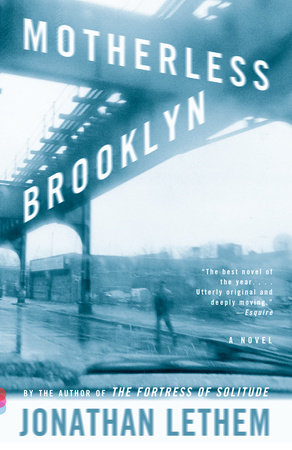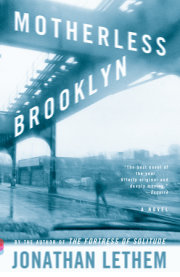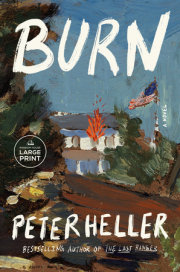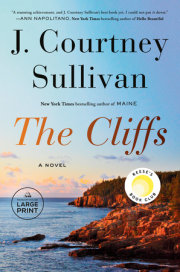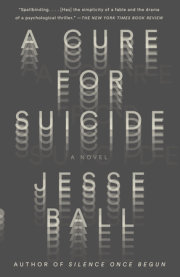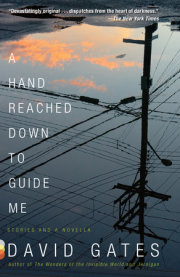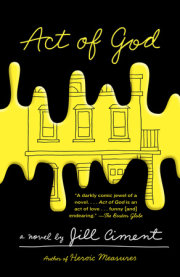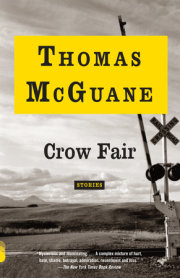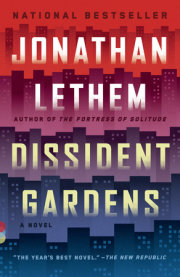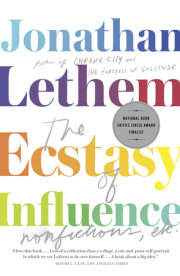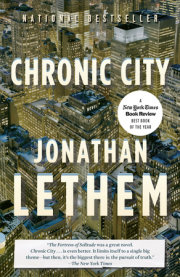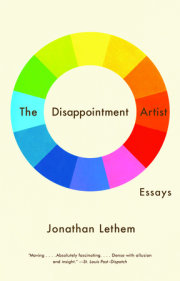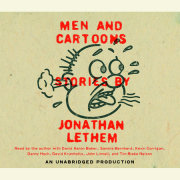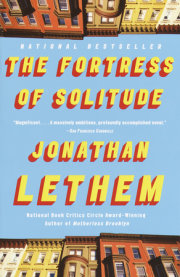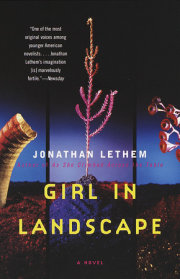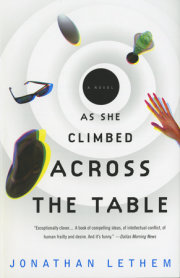Walks IntoContext is everything. Dress me up and see. I'm a carnival barker, an auctioneer, a downtown performance artist, a speaker in tongues, a senator drunk on filibuster.
I've got Tourette's. My mouth won't quit, though mostly I whisper or subvocalize like I'm reading aloud, my Adam's apple bobbing, jaw muscle beating like a miniature heart under my cheek, the noise suppressed, the words escaping silently, mere ghosts of themselves, husks empty of breath and tone. (If I were a Dick Tracy villain, I'd have to be Mumbles.) In this diminished form the words rush out of the cornucopia of my brain to course over the surface of the world, tickling reality like fingers on piano keys. Caressing, nudging. They're an invisible army on a peacekeeping mission, a peaceable horde. They mean no harm. They placate, interpret, massage. Everywhere they're smoothing down imperfections, putting hairs in place, putting ducks in a row, replacing divots. Counting and polishing the silver. Patting old ladies gently on the behind, eliciting a giggle. Only--here's the rub--when they find too much perfection, when the surface is already buffed smooth, the ducks already orderly, the old ladies complacent, then my little army rebels, breaks into the stores. Reality needs a prick here and there, the carpet needs a flaw. My words begin plucking at threads nervously, seeking purchase, a weak point, a vulnerable ear. That's when it comes, the urge to shout in the church, the nursery, the crowded movie house. It's an itch at first. Inconsequential. But that itch is soon a torrent behind a straining dam. Noah's flood. That itch is my whole life. Here it comes now. Cover your ears. Build an ark.
"Eat me!" I scream.
* * * "Maufishful," said Gilbert Coney in response to my outburst, not even turning his head. I could barely make out the words--"My mouth is full"--both truthful and a joke, lame. Accustomed to my verbal ticcing, he didn't usually bother to comment. Now he nudged the bag of White Castles in my direction on the car seat, crinkling the paper. "Stuffinyahole."
Coney didn't rate any special consideration from me. "Eatmeeatmeeatme," I shrieked again, letting off more of the pressure in my head. Then I was able to concentrate. I helped myself to one of the tiny burgers. Unwrapping it, I lifted the top of the bun to examine the grid of holes in the patty, the slime of glistening cubed onions. This was another compulsion. I always had to look inside a White Castle, to appreciate the contrast of machine-tooled burger and nubbin of fried goo. kaos and control. Then I did more or less as Gilbert had suggested--pushed it into my mouth whole. The ancient slogan
Buy 'em by the sack humming deep in my head, jaw working to grind the slider into swallowable chunks, I turned back to stare out the window at the house.
Food really mellows me out.
We were putting a stakeout on 109 East Eighty-fourth Street, a lone town house pinned between giant doorman apartment buildings, in and out of the foyers of which bicycle deliverymen with bags of hot Chinese flitted like tired moths in the fading November light. It was dinner hour in Yorktown. Gilbert Coney and I had done our part to join the feast, detouring up into Spanish Harlem for the burgers. There's only one White Castle left in Manhattan, on East 103rd. It's not as good as some of the suburban outlets. You can't watch them prepare your order anymore, and to tell the truth I've begun to wonder if they're microwaving the buns instead of steaming them. Alas. Taking our boodle of thusly compromised sliders and fries back downtown, we double-parked in front of the target address until a spot opened up. It only took a couple of minutes, though by that time the doormen on either side had made us--made us as out-of-place and nosy anyway. We were driving the Lincoln, which didn't have the "T"-series license plates or stickers or anything else to identify it as a Car Service vehicle. And we were large men, me and Gilbert. They probably thought we were cops. It didn't matter. We chowed and watched.
Not that we knew what we were doing there. Minna had sent us without saying why, which was usual enough, even if the address wasn't. Minna Agency errands mostly stuck us in Brooklyn, rarely far from Court Street, in fact. Carroll Gardens and Cobble Hill together made a crisscrossed game board of Frank Minna's alliances and enmities, and me and Gil Coney and the other Agency Men were the markers--like Monopoly pieces, I sometimes thought, tin automobiles or terriers (not top hats, surely)--to be moved around that game board. Here on the Upper East Side we were off our customary map,
Automobile and
Terrier in Candyland--or maybe in the study with Colonel Mustard.
"What's that sign?" said Coney. He pointed with his glistening chin at the town house doorway. I looked.
" 'Yorkville Zendo,' " I read off the bronze plaque on the door, and my fevered brain processed the words and settled with interest on the odd one. "Eat me Zendo!" I muttered through clenched teeth.
Gilbert took it, rightly, as my way of puzzling over the unfamiliarity. "Yeah, what's that
Zendo? What's that?"
"Maybe like Zen," I said.
"I don't know from that."
"Zen like Buddhism," I said. "Zen master, you know."
"Zen master?"
"You know, like kung-fu master."
"Hrrph," said Coney.
And so after this brief turn at investigation we settled back into our complacent chewing. Of course after any talk my brain was busy with at least some low-level version of echolalia salad:
Don't know from Zendo, Ken-like Zung Fu, Feng Shui master, Fungo bastard, Zen masturbation, Eat me! But it didn't require voicing, not now, not with White Castles to unscrew, inspect and devour. I was on my third. I fit it into my mouth, then glanced up at the doorway of One-oh-nine, jerking my head as if the building had been sneaking up on me. Coney and the other Minna Agency operatives loved doing stakeouts with me, since my compulsiveness forced me to eyeball the site or mark in question every thirty seconds or so, thereby saving them the trouble of swiveling their necks. A similar logic explained my popularity at wiretap parties--give me a key list of trigger words to listen for in a conversation and I'd think about nothing else, nearly jumping out of my clothes at hearing the slightest hint of one, while the same task invariably drew anyone else toward blissful sleep.
While I chewed on number three and monitored the uneventful Yorkville Zendo entrance my hands busily frisked the paper sack of Castles, counting to be sure I had three remaining. We'd purchased a bag of twelve, and not only did Coney know I had to have my six, he also knew he was pleasing me, tickling my Touretter's obsessive-compulsive instincts, by matching my number with his own. Gilbert Coney was a big lug with a heart of gold, I guess. Or maybe he was just trainable. My tics and obsessions kept the other Minna Men amused, but also wore them out, made them weirdly compliant and complicit.
A woman turned from the sidewalk onto the stoop of the town house and went up to the door. Short dark hair, squarish glasses, that was all I saw before her back was to us. She wore a pea coat. Sworls of black hair at her neck, under the boyish haircut. Twenty-five maybe, or maybe eighteen.
"She's going in," said Coney.
"Look, she's got a key," I said.
"What's Frank want us to do?"
"Just watch. Take a note. What time is it?"
Coney crumpled another Castle wrapper and pointed at the glove compartment. "You take a note. It's six forty-five."
I popped the compartment--the click-release of the plastic latch was a delicious hollow sound, which I knew I'd want to repeat, at least approximately--and found the small notebook inside. GIRL, I wrote, then crossed it out. WOMAN, HAIR, GLASSES, KEY. 6:45. The notes were to myself, since I only had to be able to report verbally to Minna. If that. For all we knew, he might want us out here to scare someone, or to wait for some delivery. I left the notebook beside the Castles on the seat between us and slapped the compartment door shut again, then delivered six redundant slaps to the same spot to ventilate my brain's pressure by reproducing the hollow thump I'd liked. Six was a lucky number tonight, six burgers, six forty-five. So six slaps.
* * *For me, counting and touching things and repeating words are all the same activity. Tourette's is just one big lifetime of tag, really. The world (or my brain--same thing) appoints me it, again and again. So I tag back.
Can it do otherwise? If you've ever been
it you know the answer.
Copyright © 2000 by Jonathan Lethem. All rights reserved. No part of this excerpt may be reproduced or reprinted without permission in writing from the publisher.

